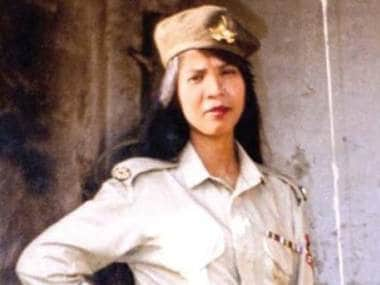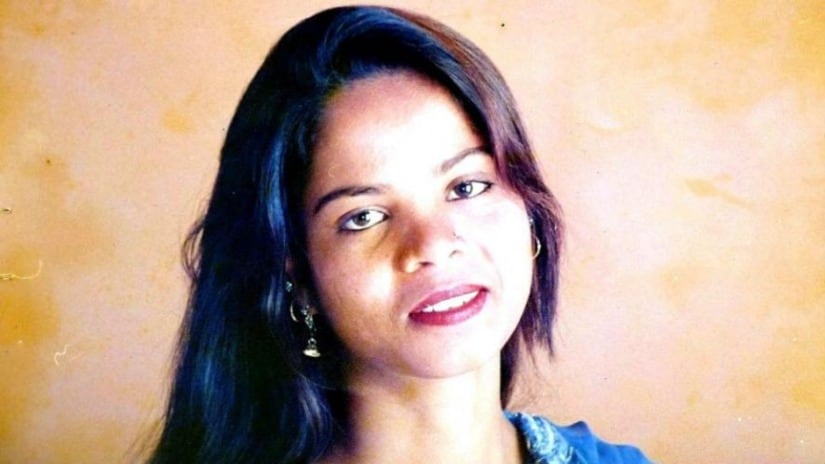
[ad_1]
It was the women refusing to drink water from the hands of Asia Bibi, a Christian, who insulted her religion and were no less blasphemous, according to Pakistan Supreme Court Justice Asif Saeed Khan Khosa. In his concurring and separate opinion to the final order announced on 31 October, acquitting Asia Bibi of blasphemy, he said, “According to the Holy Quran a Muslim’s faith is not complete till he believes in all the Holy Prophets and Messengers of Almighty Allah including Jesus Christ (Isa son of Maryam) and all the revealed Holy Books of Almighty Allah including the Holy Bible. From that perspective insulting the appellant’s religion by her Muslim co-workers was no less blasphemous.”
Pakistan Supreme Court chief justice Mian Saqib Nisar and justices Khosa and Mazhar Alam Khan Miankhel delivered a landmark order which castigated the investigation into the blasphemy case against Asia Bibi and reversed the judgments of the Lahore High Court and the trial court and the conviction of death sentence. The order said that when there is any doubt in the prosecution story, benefit should be given to the accused, which is quite consistent with the safe administration of criminal justice.
Asia Bibi was freed from Multan jail on the night of 7 November, but the rumours that she has left the country are not confirmed. Her husband has been appealing for asylum abroad for herself and her family as it is dangerous for them to live in Pakistan. Her lawyer Saif-ul-Malook has already left the country.

File image of Asia Bibi
The main witnesses, Asma and Mafia, who learnt the Quran from the complainant Qari Muhammed Salaam’s wife, had conveniently omitted that there was a quarrel when Asia Bibi offered water to the Muslim women who along with her were plucking blue berries (falsa) in a field in Ittanwali village (Firozpur district, Punjab) on 14 June, 2009. They refused to accept water from the hands of a Christian, after which there was a fight. This fact is not mentioned in their testimonies and the first information report (FIR). It was thanks to the court witness and the investigating officer, who were independent witnesses, that this came to light, Justice Khosa noted.
The court found that the case of blasphemy was riddled with inconsistencies and contradictions leading to her being set free. It also demolished with extensive quotes from the Quran and the scriptures that Islam was against Christianity.
Nine long years after a case of blasphemy was filed against her, and three years after Asia Bibi’s appeal against her death sentence in 2014, she is finally free, but in the face of vicious protests and antipathy to her release, her freedom to continue her life in her own home with her husband and two children is in peril. After her acquittal which provoked widespread protests, there was a government deal reportedly with fundamentalists screaming for her blood, who demanded that she should not be allowed to leave the country. After the order, Qari Salaam has filed a review petition before the Supreme Court, challenging the acquittal, and asked for Asia Bibi to be placed on the exit control list pending the review proceedings.
The court pointed out that since 1990, 62 people have been killed over allegations of blasphemy, and in 2017, Mashal Khan, a student of Abdul Wali Khan University, Mardan, was killed by a mob in the premises of the university after rumours that he posted “blasphemous” content online.
In 2012, young Rimsha Masih, a mentally challenged girl was arrested on charges of blasphemy. She was also acquitted, and had to seek asylum abroad a year later. The complainant, a cleric, just as in this case, filed a false complaint that Rimsha tore up and burnt copies of the Quran. Former Punjab governor Salman Taseer was shot dead by his guard Malik Mumtaz Qadri on 4 January 2011 for demanding a pardon to Asia Bibi and attacking the blasphemy law. Months later, Shahbaz Bhatti, Pakistan’s minorities minister, was also killed. There was a time when few lawyers were willing to represent Asia Bibi and despair after Qadri looked nowhere near getting punished till 2016, when he was executed.
Under a large tree in Kohsar Market in Islamabad, every year in January, a small group of family and friends gather in commemoration at the spot under a tree where Taseer was pumped with bullets by his guard. He has been finally vindicated for backing Asia — a stand which cost him his own life.
“Blasphemy is a serious offence but the insult of the appellant’s religion and religious sensibilities by the complainant party and then mixing truth with falsehood in the name of the Holy Prophet Muhammad was also not short of being blasphemous. It is ironical that in the Arabic language the appellant’s name Asia means ‘sinful’ but in the circumstances of the present case she appears to be a person, in the words of Shakespeare’s King Lear, ‘more sinned against than sinning,'” Justice Khosa added.
He invokes covenants, specially the Covenant of the Prophet Muhammad with the Monks of Mount Sinai, known as the Promise to St Catherine. Around the year 628 AD, a delegation from St Catherine’s Monastery, the world’s oldest monastery located at the foot of Mount Sinai in Egypt, came to the Holy Prophet Muhammad to request his protection and he responded by granting them a charter of rights, not limited to St Catherine alone. The promise is clearly violated in this and other cases.
While the incident took place on 14 June 2009, the two women Mafia and Asma, both sisters and Yasmin (who was not made a witness later) reported this to the wife of Qari Salaam, who took five days—June 19—to file a police complaint at Sadar Nankana Sahib. That same day, Asia was summoned to a public meeting where she reportedly confessed her guilt.
Reviewing the case, the court found many inconsistencies in the accounts of witnesses and the grave omission of the quarrel over water from their narratives. Under the law (section 156 A of the Criminal Procedure Code), cases of blasphemy are to be investigated by a police office of a rank of superintendent of police (SP) — yet this case was inquired into by a police inspector and transferred to an SP Muhammed Amin Bukhari of Sheikhupura only on 26 June.
The court said that Asia Bibi, in her statement recorded under section 342 of the CrPC, had expressed her full respect to the Holy Prophet and the Holy Quran and she offered to take an oath on the Bible to the investigation officer (IO) to prove her innocence which was refused by the IO. Therefore, the appellant being innocent deserves acquittal. Further, no prior permission of the Central/Provincial Government was obtained before the registration of the FIR, as in mandatory under the law.
The case of the cleric Qari Salaam rested on the statements of Asma and Mafia who contended that Asia Bibi made derogatory remarks about the Prophet Muhammed. However, they also mentioned that there were 25 to 30 women present, but none of them had come forward to give evidence. The judges found the delay of five days in registering the FIR casting “a serious dent on the prosecution story, and added that keeping in mind the evidence produced by the prosecution against the alleged blasphemy committed by the appellant, the prosecution has categorically failed to prove its case beyond reasonable doubt.”
The chief justice ended his part of the order with a quote from Prophet Muhammad: “Beware! Whoever is cruel and hard on a non-Muslim minority, or curtails their rights, or burdens them with more than they can bear, or takes anything from them against their free will; I (Prophet Muhammad) will complain against the person on the Day of Judgment.”
Justice Khosa found “that the evidence produced by the prosecution in respect of the said public gathering five days after the incident and about what transpired there was not only an afterthought but was nothing short of concoction incarnate.” He also found it strange that Qari Salaam didn’t remember who drafted the FIR and where he had presented it for filing. He was not present at the time of the incident. The complainant and the FIR lodged by him, thus, were not worthy of much credit, he said.
The order is significant as Asia Bibi’s appeal was the first blasphemy appeal under 295-C (defamation of the Prophet Muhammad) being heard by the Supreme Court since 2002, said Reema Omer, International Legal Advisor, South Asia Programme, International Commission of Jurists. The Court has so far not upheld any convictions for blasphemy under section 295-C, though dozens of people have been convicted by trial courts and a number of appeals are pending before various appellate forums. High courts too, have only upheld blasphemy convictions under 295-C in a handful of cases. The Supreme Court also noted that the context indicates the charges could have arisen from a “false allegation” of blasphemy, echoing concerns also raised by the International Court of Justice (ICJ) and others that the blasphemy laws in Pakistan have typically become an instrument of personal vendettas and malicious motivations.
However, Omer said given the context in which blasphemy allegations are made — including severe infringements to the right to a fair trial in such cases because of the threats to the accused, their families, judges and lawyers, as well as the bias against the blasphemy accused that impacts the impartiality of the process — it is unlikely that this judgment alone would make a difference in how future cases are decided.
[ad_2]
Source link